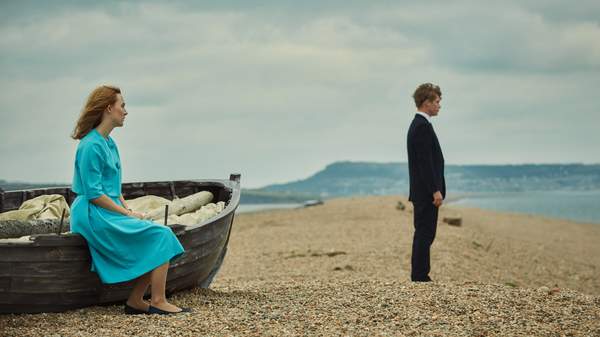Overview
Playing a 13-year-old in Atonement, Saoirse Ronan changed lives with a series of lies. As a twenty-something newlywed in On Chesil Beach, she slings the truth, but its piercing impact is just as sharp. Both roles stem from the pen of British author Ian McEwan and, while Ronan's career hasn't lacked highlights during the 11 years between the two, both demonstrate the depth of her talents. In the Brooklyn and Lady Bird star's hands, the two distinctive yet relatable characters are much closer than they might initially seem: a petulant, misguided teen misconstruing the facts as a way of coping with her own feelings, and a kind, exacting woman sharing what's really in her heart in an effort to do the same.
Mere hours after saying "I do", Ronan's Florence has her whole married life in front of her. It's 1962, she's honeymooning by the pebbly shore of Dorset with her new husband Edward (Billy Howle), and when to have dinner seems like the duo's biggest worry. And yet, before darkness falls on their first night away, their wedded bliss will prove short-lived. First, they're playfully disagreeing about music choices. Next, they're trying to stay polite around interrupting wait staff. Soon, they're awkwardly trying to consummate their nuptials — which, instead of bringing the couple closer together, only drives them apart.
Where romantic splendour becomes matrimonial sorrow, that's where On Chesil Beach finds its story. With a bittersweet mood painted across its frames, the film burrows into the heart of a fresh but fraught relationship — one that's just getting started, but is already saddled with heavy expectations and weighty complications. That said, this isn't a simple case of opposites attracting and then imploding, or of two besotted paramours following their feelings instead of their thoughts, although both ring true in some fashion. Classical violinist Florence is sweet and driven, from a middle-class family, and has a very clear view of her future. Edward is an English graduate with no set career path, harking from a much more modest background, and fond of rock and roll. What plagues the couple, however, is a dilemma that everyone faces at some point in their lives: the consequences of truly being honest with each other.
As Florence and Edward's marriage wilts faster than the flowers that Florence undoubtedly carried down the aisle that same day, an intimate tale begets an intimate picture. Indeed, it's fitting that On Chesil Beach heralds the filmmaking debut of theatre and television director Dominic Cooke, with conversation — and the gaps between the sometimes passionate, sometimes tentative chatter — reigning supreme. Still, marking just the fourth time that prolific novelist McEwan has adapted his own work for the screen, the movie benefits from one of the writer's trademarks. Conveyed here through flashbacks to various points during the couple's courtship, On Chesil Beach never forgets that every single moment, act and discussion is the culmination of a lifetime's worth of desires, woes, emotions and experiences.
Unsurprisingly, the resulting film is filled with complex characters not only navigating a difficult situation, but brandishing intricate histories. Meticulously and delicately directed by Cooke with an eye for the blandness of routine British life, the scenic glory of the movie's titular location, and the growing space between his protagonists, On Chesil Beach is also a film that's vastly improved by its stars. As astute and insightful as McEwan's narrative is, it's the performances that give texture to a tale that otherwise works better on the page — including in its ending. That Howle more than holds his own against three-time Oscar-nominee Ronan is no minor achievement, and together they make this thorny fictional romance seem devastatingly real.
